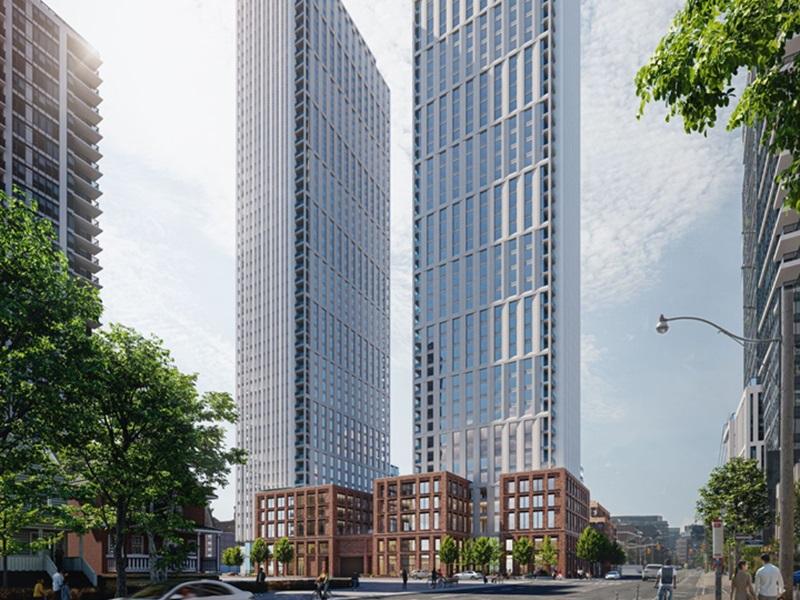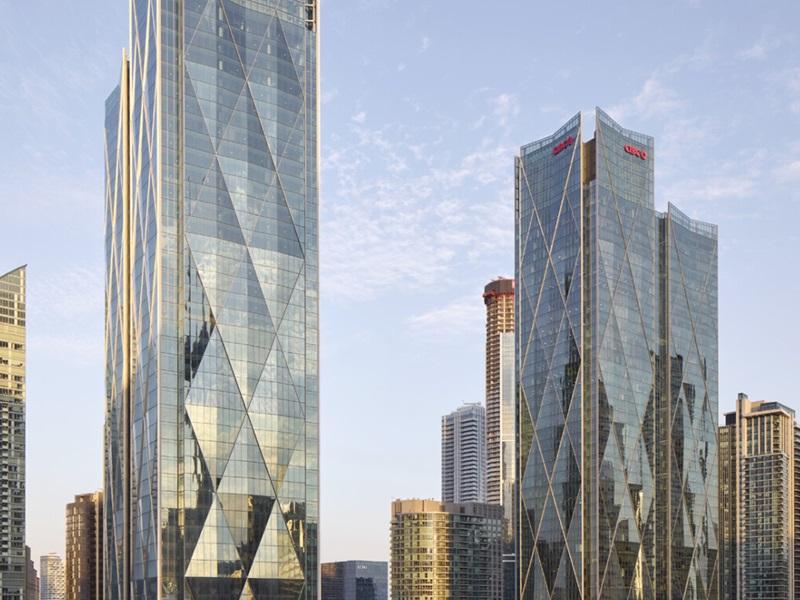
A rendering of the redevelopment of 700 University Ave. in Toronto, which is planned by KingSett Capital. (Courtesy KingSett)
A three-pronged redevelopment on the site of the iconic curved glass office building at 700 University Ave. will add significant life sciences, retail and residential space to Toronto’s Discovery District.
The KingSett Capital-owned, 20-storey, 1.22-million-square-foot building at the southwest corner of University Avenue and College Street was built in 1975 and last renovated in 2000.
Intact Insurance is the largest office tenant in the building, which also includes restaurants, a food court, a daycare, a pharmacy and banking facilities in its lower levels.
The Triovest-managed building received BOMA Canada’s TOBY Award for best building of more than a million square feet in 2020 and KingSett Capital Sustainability Awards for energy and water reduction a year earlier. It has an Energy Star score of 88 and has been a GRESB participant since 2017.
The building is BOMA BEST Gold, SmartScore, WiredScore, Fitwel, WELL Health-Safety Rating and Rick Hansen Foundation Accessibility-certified.
The upcoming additions to the property will be truly transformational.
“We have the ability to activate quite a bit on this site,” KingSett senior vice-president of office Jamie Petch told RENX of the project, for which all aspects of zoning have been approved. “It’s very exciting.”
Life sciences addition
Perhaps the most innovative feature of the redevelopment will be a four-storey addition to the top of the existing building, called exploration labs, which will be dedicated to high-performance life sciences research space.
It will encompass 187,000 square feet, with floor plates averaging between 35,000 and 50,000 square feet and 15-foot ceilings. It will also include access to a penthouse event space, the roof, an eco-porch and an exterior walkway on the 21st floor.
Petch said KingSett knew it could add four additional storeys to the building without additional reinforcement work, which would have added to costs and affected existing tenant space. The original intention was to build offices, but high demand for life sciences space in the Discovery District led to a change in plans.
The Discovery District encompasses two square kilometres and includes the University of Toronto, nine teaching hospitals and more than 30 specialized medical and related sciences research centres that employ more than 50,000 — with more than 22,000 jobs in medical care and research-related fields.
There’s plenty of interaction between professionals in the public and private research communities, so having large numbers of these facilities and workers in close proximity is important and attractive.
“We get a lot of calls for space in the building from labs and life sciences,” said Petch. “That’s mainly due to the proximity to MaRS, the university and the hospitals.
“The existing building couldn’t handle that, mainly because it’s hard to retrofit an office building for purposes like labs because things like HVAC, loading and vibration in the structure are very difficult to accommodate in an existing office building.”
Marketing process has begun
Colliers is working with Triovest in leading the search for tenants. Senior VP and sales representative Mike King told RENX it’s scheduling both on-site and virtual presentations and interest has been high from the brokerage and research communities.

A rendering of the four-storey addition which will be added to 700 University Ave. in Toronto during a redevelopment by owner KingSett Capital. It will be dedicated to life sciences space. (Courtesy KingSett)
“700 University is a fantastic building with an unusually large floor plate, located in the perfect location to tap into the intellectual capital of the University of Toronto and all of the teaching and research hospitals all around it. The vacancy in the area is low, which speaks to the demand for being in proximity to them.”
King said one tenant could take the entire space, but multi-tenant design is in place and Colliers envisions something in the neighbourhood of four tenants occupying a single floor.
“There are some interested parties right now. COVID has certainly slowed the decision-making process with any number of groups, whether it’s for traditional space or research space. But I think that given the scarcity of lab space in the area, we’re hopeful that we’ll have someone talking to us very soon.”
“The tenants for this building may or may not be in Toronto at this point,” said Petch. “It will be a global search because it is such a specific and special address to be adding this space.
“We’re hoping to hear some names that you probably haven’t heard in our market before looking at the space.”
Architecture and design
KPMB Architects is the design architect for the overall redevelopment project and has been working with Adamson Associates Architects on the construction documents. Gensler has been brought in specifically for the four-storey addition because it has a life sciences practice.
“They have a great understanding of the space and what the needs are globally,” said Petch. “Whoever’s going to lease this space has the same challenges for attraction, retention and employee productivity as any other employer, whether it’s in the office space or the life sciences space.
“Getting their (Gensler’s) view on how to design and build this space to optimize companies’ decision to locate here for their people was critical. They provided a lot of insight for us.”
Construction of the life sciences addition will start in Q4 2022 and the space is expected to be turned over to tenants for fixturing three years later.
“The envelope is an enhanced envelope so there’s more robust heating, ventilation and air-conditioning, higher ceiling heights, and being mindful of vibrations, floor load and power,” said King.
“It’s being designed with tenants in mind to actually save them capital when they go to improve their space.”
New ground-floor and concourse pavilion
There’s 51,500 square feet of retail space at 700 University now, but King said those sections of the building feature different elevations, so the interior and exterior spaces aren’t being utilized efficiently.
“The idea is to bring forward the lobby by way of the pavilion to the corner and turn some of those elevations into amenity spaces for occupants of the building and to people who are taking advantage of the retail amenities that will be in the building,” said King.
“The other thing is that they’re pulling the entry closer to the corner and improving the access for the TTC. It’s as much about aesthetics as it is improving the logistics and tenant experience.”
“When you look at the building right now, it’s set back quite a bit from the corner of College and University,” said Petch. “We’re going to build a multi-storey retail pavilion from the ground, the concourse and down to the sub-concourse that will add about 140,000 square feet of leasable area.”
The new pavilion will include cafes, restaurants, retail, banking services and open seating areas. It will offer direct access to the Toronto Transit Commission’s Queens Park subway station and pathways that connect to MaRS, Toronto General and Mount Sinai hospitals.
Construction of the pavilion will be done in conjunction with the life sciences addition.
New residential rental tower
The site has room for further intensification and KingSett will build a 57-storey tower with approximately 480 rental apartment units in a range of sizes at the southwest corner, where a low-rise service and back-of-house area currently resides.
“There’s not a lot of residential rental in the neighbourhood,” said Petch.
“Our neighbours, the hospitals and the university were quite supportive of the application to build that because of its appeal to residents coming to work at the hospitals for a few years and professional people and students in the neighbourhood.
“They’ll have the ability to rent in a building right in the middle of the neighbourhood.”
The residential tower is expected to be completed in late 2026.











